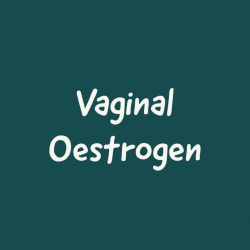During a Women’s health physiotherapy assessment or prior to a pessary fitting we may work together with your GP or one of our Specialist Menopause GP’s in clinic, to consider the benefits of using local vaginal oestrogen, particularly for women that are peri or post-menopausal.
What is vaginal oestrogen?
- Low dose oestrogen
- Cream or a pessary that can be used vaginally to help localised symptoms
- It’s not classed as HRT due to such low dose
- It’s a safe option.
What symptoms can it help with?
It can help with a variety of symptoms which are normally associated with low oestrogen. This can happen post-partum, perimenopausal and postmenopausal.
- Vaginal dryness - can cause soreness and cuts which can be incredibly painful when sitting, putting on tight clothing, intercourse and during smear tests.
- Urinary symptoms such as increased frequency of urination and itching – often misdiagnosed as UTI’s or Thrush infections with no resolve in symptoms using thrush creams or antibiotics.
- Recurrent urinary tract infections – can sometimes be because of low oestrogen on the tissues inside the urethra (the tube you urinate through).
How does it work?
We have oestrogen receptors all over our body including around the vagina, bladder, and urethra. Giving oestrogen back to those receptors it helps to boost oestrogen locally which in turn helps with improved lubrication. Increase in lubrication can help slightly change the acidity in the vagina reducing the risk of infections and ultimately, improving wider symptoms associated with vaginal dryness.
How is it applied?
This will depend on what is preferable for the patient. Vaginal oestrogen can come in a variety of forms.
- Pessary form, such as a small bullet shaped pessary or a small pill shaped pessary
- The E-string pessary is a round shaped pessary which releases low does oestrogen slowly and it stays inside the vagina for up to 3 months. It can be used with a supportive pessary for pelvic organ prolapse. It might be moved with intercourse.
- Cream or Gel
- The cream can be applied locally to the externally tissues around the vulva area.
They are used with or without an applicator and applied vaginally at night. If dryness is severe then it’s recommended to use the cream initially, or alongside a vaginal moisturiser such as YES, YES, YES or Olive and Bee.
Is it safe?
Yes – this is a safe option.
The information leaflets that are provided with vaginal oestrogen are unfortunately quite inaccurate and they talk about any type of oestrogen.
- Vaginal oestrogen is a very low dose of localised oestrogen.
- There are no increased risk of blood clots and you do not need to use progesterone.
- Breast Ca studies state that the use of vaginal oestrogen does not increase the risk of breast cancer or reoccurrence of breast cancer. (It’s always important to discuss with your oncologist team or menopause specialist but it is an option if you are experiencing any of the vaginal symptoms.) However, if you are taking Letrozole for breast cancer, you cannot use Vaginal Oestrogen.
What are the alternatives?
Our recommendations:
- Do not use soaps to wash your vulva/vaginal area!!
- Yes, Yes, Yes
- Olive and Bee
- Replenish
- Sylk
What else can help?
The Gold standard treatment for what is called ‘uro-genital atrophy of the menopause’ is pelvic floor muscle exercises to increase flexibility and strength combined with vaginal local oestrogen. Pelvic floor muscle training supervised by a physiotherapist, to teach you how to do it correctly is supported by evidence, it works! Our friendly team of specialist women’s health physiotherapists is happy to help: https://www.whitehartclinic.co.uk/treatments/womens-physio-south-west-london
In the NICE guidelines its recommended as best practice for post-menopausal women to use vaginal oestrogen with use of a vaginal pessary for pelvic organ prolapse.
The use of vaginal oestrogen with a pessary for pelvic organ prolapse has been shown to exhibit a higher incidence of continued pessary use and lower incidence of increased vaginal discharge than women who did not.
Not sure where to go now?
Talk to your GP, gynaecologist, or women’s health physiotherapist if you have any of the above vaginal or vulvae symptoms. Do not suffer in silence.
Follow our recommended professional pages:
White Hart Clinic - @whitehartclinic
Menopause Care - @menopause_care
Dr Eloise Elphinstone, Specialist Menopause GP - @the_womenshealth_gp
Our Barnes Clinic
Our clinic is located in Barnes, South-West London and is easily accessible by public transport.
For more information including parking and other practicalities see our Barnes clinic page
Book an Appointment
Booking an appointment with one of our therapists is quick and easy. There is no long waiting time and you don’t need a referral from your GP.



